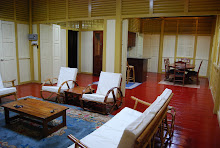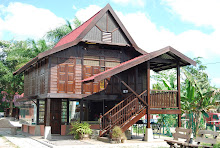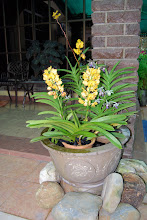YOU ARE ONE IF YOU ARE A MAN; literally in all senses of course.
Happy days during Aidilfitri this year, make me want to look back at this glorifying episode of man’s control over things. It has been a man’s world with him at the helm in most activities. Be it at home, office, politic, government, apex of leadership and religious positions. Once in a while, she comes into the picture: a Bank Negara Governor, a Vice Chancellor, an Ambassador, a Fighter Pilot, State Chief Police Officer, a scientist that decided to drop onto the North Pole and even a Prime Minister (as in Britain and Pakistan); executive and high challenging posts held and trusted upon the fairer sex. Still it never becomes a matriarchal world. His domineering exclusiveness prevails.
Originally a patriarch was a man who exercised autocratic authority as a ‘pater familias’ over an extended family. ‘Patriarch’ is derived from a Greek word; a composition of ‘pater’ meaning father and ‘archon’ meaning leader, chief. ruler. king etc.
That system of such rule of families by male is called patriarchy. Patriarchy not only explains how our society functions but how it controls women. It is a topic which can arouse all furies given the right leverage but this is not the platform.
Some of the older movies of Hollywood, the likes of “The Godfather”, “Sopranos”, and “Al Capone” hit us with the sinister and gangster of the New York and Chicago mobs and their Italian connections. Not to mention the lead role of the patriarch feared and untouched by many as acted in the movies by leading actors as Humphrey Bogart, James Cagney, Edward G Robinson and Rod Steigner. We seemed to be taken aback by these famous roles, as they had what most people wanted: fame, dressy clothing, smooth talking and commanding authority. Therefore it was no surprise that fashion and adoptive styles throughout the world took to the tough stance of the 1920’s. Supposedly big business in the metropolitan areas of New York, Chicago etc in the roaring forties and earlier functioned in that order or otherwise it was ‘kaput’ for everyone.
Ours is to observe the common highlights where traditions continue in all its fairness, helping to bind families closer. The patriarch I meant to refer here is actually us: the male who can call himself a dad, a papa or a father. Certainly the hierarchy intensifies when he is the head of a larger family and senior in age naturally. A grand father alive and much adored by the children and grand-children typifies the role of a patriarch. Though his role departs strongly from the rough and energetic model that we saw above, his off-springs see a more distinguished person, rich in experience, condescending in all matters and loving and trustful. They failed to see even a minute tough-guy mannerism. They appreciate more when the ‘duit raya’ or ‘ang pau’ becomes a contributing factor at the ‘Aidilftri’ or Chinese New Year celebration thrown by the ‘famous’ patriarch whom they meet only once a year and who himself is honored and happy that the off springs are around.
To be recognized and known as a patriarch comes with experience and guidance. Yet no one has undergone a training scheme just as much as no one trained you to become a father. You become one in virtue of your marriage and later beget a child or more. You picked up bit by bit some of the rudiments, maybe having to sieve through the good, the better and the best. Years go by and you become wiser while enlarging the family circle. Then suddenly you are where you are now a grand dad with your spouse and the breed plus the younger children which take an honorific ‘grand’ as a qualification to their status. You get to be called ‘Pa Long / Pa Chak’ and later upgraded to ‘Tok Long /Tok Chak’ qualifying your status in the family hierarchy.
This Aidilfitri celebration put me through a role liking as a patriarch. This accompanying picture captures the intensity and concentration given to the headman of the family at any given moment. Being the most senior, with my own family and enjoined by several brothers and sisters-in-laws added with their spouses and children, all naturally listened to whatever advice I put across: specifically when it comes to planning strategies at organizing a wedding ceremony and reception; more so when the D-Day is scheduled in the next forty-eight hours. It has to be task oriented, problem solving and group dynamic at its best. All members of the family were called to help because it involved the family and the expectancy of two thousand guests at the least. This was a marriage planner helping the family.
Happy days during Aidilfitri this year, make me want to look back at this glorifying episode of man’s control over things. It has been a man’s world with him at the helm in most activities. Be it at home, office, politic, government, apex of leadership and religious positions. Once in a while, she comes into the picture: a Bank Negara Governor, a Vice Chancellor, an Ambassador, a Fighter Pilot, State Chief Police Officer, a scientist that decided to drop onto the North Pole and even a Prime Minister (as in Britain and Pakistan); executive and high challenging posts held and trusted upon the fairer sex. Still it never becomes a matriarchal world. His domineering exclusiveness prevails.
Originally a patriarch was a man who exercised autocratic authority as a ‘pater familias’ over an extended family. ‘Patriarch’ is derived from a Greek word; a composition of ‘pater’ meaning father and ‘archon’ meaning leader, chief. ruler. king etc.
That system of such rule of families by male is called patriarchy. Patriarchy not only explains how our society functions but how it controls women. It is a topic which can arouse all furies given the right leverage but this is not the platform.
Some of the older movies of Hollywood, the likes of “The Godfather”, “Sopranos”, and “Al Capone” hit us with the sinister and gangster of the New York and Chicago mobs and their Italian connections. Not to mention the lead role of the patriarch feared and untouched by many as acted in the movies by leading actors as Humphrey Bogart, James Cagney, Edward G Robinson and Rod Steigner. We seemed to be taken aback by these famous roles, as they had what most people wanted: fame, dressy clothing, smooth talking and commanding authority. Therefore it was no surprise that fashion and adoptive styles throughout the world took to the tough stance of the 1920’s. Supposedly big business in the metropolitan areas of New York, Chicago etc in the roaring forties and earlier functioned in that order or otherwise it was ‘kaput’ for everyone.
Ours is to observe the common highlights where traditions continue in all its fairness, helping to bind families closer. The patriarch I meant to refer here is actually us: the male who can call himself a dad, a papa or a father. Certainly the hierarchy intensifies when he is the head of a larger family and senior in age naturally. A grand father alive and much adored by the children and grand-children typifies the role of a patriarch. Though his role departs strongly from the rough and energetic model that we saw above, his off-springs see a more distinguished person, rich in experience, condescending in all matters and loving and trustful. They failed to see even a minute tough-guy mannerism. They appreciate more when the ‘duit raya’ or ‘ang pau’ becomes a contributing factor at the ‘Aidilftri’ or Chinese New Year celebration thrown by the ‘famous’ patriarch whom they meet only once a year and who himself is honored and happy that the off springs are around.
To be recognized and known as a patriarch comes with experience and guidance. Yet no one has undergone a training scheme just as much as no one trained you to become a father. You become one in virtue of your marriage and later beget a child or more. You picked up bit by bit some of the rudiments, maybe having to sieve through the good, the better and the best. Years go by and you become wiser while enlarging the family circle. Then suddenly you are where you are now a grand dad with your spouse and the breed plus the younger children which take an honorific ‘grand’ as a qualification to their status. You get to be called ‘Pa Long / Pa Chak’ and later upgraded to ‘Tok Long /Tok Chak’ qualifying your status in the family hierarchy.
This Aidilfitri celebration put me through a role liking as a patriarch. This accompanying picture captures the intensity and concentration given to the headman of the family at any given moment. Being the most senior, with my own family and enjoined by several brothers and sisters-in-laws added with their spouses and children, all naturally listened to whatever advice I put across: specifically when it comes to planning strategies at organizing a wedding ceremony and reception; more so when the D-Day is scheduled in the next forty-eight hours. It has to be task oriented, problem solving and group dynamic at its best. All members of the family were called to help because it involved the family and the expectancy of two thousand guests at the least. This was a marriage planner helping the family.
 "Now listen carefully. We have an assignment tomorrow to be executed.Everyone must make sure that it is done according to plan, No excuse, no 'buts' ". Tok Wan the patriarch talks.
"Now listen carefully. We have an assignment tomorrow to be executed.Everyone must make sure that it is done according to plan, No excuse, no 'buts' ". Tok Wan the patriarch talks. They listened rapt at the briefings for their assignments
They listened rapt at the briefings for their assignmentsIt was a moment to tell all, adults and children that marriage and its ceremonies do not come easily. A couple falls in love as a start. Then the rigmarole begins for the bride and bridegroom sides, with varied stages. Most people only see the final stage when the wedding is solemnized, wedding receptions laid out and the happy occasion takes place with all the grandeur whether held in a five- star hotel or the backyard of a kampong house. My audience of young parents with their siblings who have not yet ventured into this adventure before listened with rapt silence, accepting that their big brother or the patriarch must know all since he has had several acts in the game. It was a golden session because we had a complete check-list of what to do and who is responsible. The whole ceremony from start to finish comes into focus and it should be a breeze if all goes well. The weather, tents, sitting arrangement, food catering, parking, welcoming, main table arrangement, wedding ceremonies etc. were on the platter. It was a start for many and by next year one or two of them would be ready to handle their own when their very own ‘apple of the eye’ gets onto the ‘pelamin’ or wedding dais.
The head or patriarch has a continuing duty to his family, from the very moment he relinquished his bachelorhood and accepted a new role by marriage. He has a duty toward his wife, later his children and all those that are linked to him. Customs, traditions, beliefs etc have to be learned and adopted. How, when and where he acquires them depends on his own prowess and intelligence: the faster the better. Manners make a man is one proverb that defines the very need of it all. Professing Islam he has a definite obligation. He has to show dutifulness to his parents including showing appropriate kindness to them, invoking Allah’s blessings for them, paying attention to their advices and craving after their guidance to the right path. He must also remember that when a man dies, his acts also come to an end with the exception of three: “A recurring charity, knowledge from which people get benefited and a pious son who prays for him”.
The patriarch, whatever and whoever he is must realize that he is responsible to his parents as much as his children and they likewise have a role to play towards him. First and foremost he is the man of the house. He is the father who leads by examples. If he expects kind thoughts and blessings then he has to propagate such expectations himself among his family.
As a man, a husband, a father and a patriarch in all its definition, we do really need exposure, contact and much learning experience. Not everyone has that fortune, depending on his standing, work experience, companionship, home environment and most of all his relationship with his parents. Our education which early on puts children away from homes into hostels or residential schools takes away that natural and genuine contact. Then it becomes a life-long learning having to know what you miss at home.
The blessing of Syawal also identifies that the patriarch alone cannot accomplish all. She, the wife, the mother and the matriarch help to compliment as well as contribute to the total happiness and joy shared. It is the father and mother; mum and dad, Mak Long or Pak Long, Tok Wan and Nek that get things done together. They prepared the home for the children to come home to. The clogged highway and the sold-out tickets for all transportation justified the blessed home coming. ‘Ketupat’, ‘rendang’, ‘makmur’ and all varied kinds of cookies and the special dishes for lunch or dinner with the touch of ‘mum’ golden fingers do get praises heaped upon: surely not on the man of the house. The mother or the matriarch gets the honor. It is the woman that gives all whether in sickness or in health. Drop by any hospital the nurses that care for you do not wear trousers but skirts or dresses befiting the fairer sex. At home, the men may push the lawnmower, clean the car or water the plants but the more import resources at living and being alive are within the domain of the women.
Much as the women folks in Negeri Sembilan or the Minangkabau’s in Sumatra honor their matriarchal lineage or the Italians of Naples or the Arabs of Saudi Arabia boast of their patriarchal connection and the world continues to placate its manly strength, you and I know that neither can exist without the other and it is their combined strength that keeps this world moving and spinning.
Wait for the coming Aidilfitri and see whether you are comfortable at home as a patriarch serving the family and all the kin and assuring happiness all round.
The young kompang group that beat welcome.
The elder patriarch of the family
greeted with the customary 'salam'.

Children merriment chose neither place or time and a guest is welcomed thanks to discretion and thoughtfulness
The ladies troupe contributing their service at the function taking over the 'marhaban' normally the man's realm















3 comments:
salam, and i hope its not too late to wish you selamat hari raya.
I know the scene that you describes too well. As our father left us when we were small, it was my brother in law who took charge of everything - and with his training and background, he made sure everything was well planned.
Pak Non
An inspiring piece. Thank you.
As the eldest offspring of my parents, I get to be called Yob by my brothers and sister. And their children call me Ayahwa (that's ayah tua.
I guess I have to start now, somehow, somewhere.
What is the difference between casino games and slots?
Slot games are the most popular 1xbet korean types of gri-go.com casino games, and the worrione.com majority are slots. poormansguidetocasinogambling and the most commonly played slot games.
Post a Comment